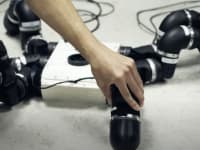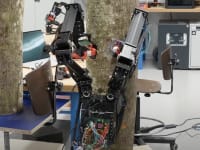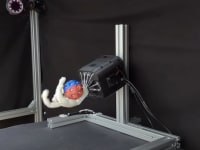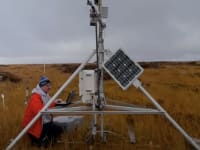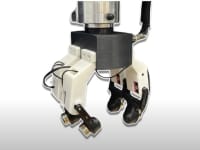61
194
-1
450
30
Question of the Week
Will We See a Greater Use of 'Beaming' Avatar Technology?
Researchers successfully tested a beaming technology that
allowed humans and a rat to interact through virtual reality avatars. Using digital
representations of themselves, the researchers enabled the rat to interact with a
rat-sized robot controlled by a human participant in a...
Question of the Week
Will We Accept the Use of Robots for Personal Care or Social Activities?
A study by the Georgia Institute of Technology
indicates that older adults are willing to use robots for the daily
activities that become more challenging with age, unless the tasks
involve personal care or social activities. After showing adults (ages
65 to 93 years) a...
Question of the Week
Is Affective Programming a Promising Technology?
The New York Times recently reported on Egyptian programmers'
attempts to train computers to recognize facial expressions and define human
emotion. This emerging technology field called "affective programming" could be used in
a variety of applications, such as providing better learning...
Question of the Week
Will We See Bio-Printed Organs in the Near Future?
3D printing has been used in the health care field to make prosthetic limbs, custom hearing aids, dental fixtures, and other helpful tools for patients. The printing technology is now being used to create more complex structures, even human tissue. Bio-printers, for example, form human tissue using...
Question of the Week: Energy
Should Pearl Harbor "go green?"
As part of the Navy's plan to convert at least 50% of its energy demands to alternative sources by 2020, the branch may cover part of Pearl Harbor with solar panels. The 4000-foot, unused runway in the center of Pearl Harbor's military base is a good location for the solar project and is "critically important to...
Question of the Week
Will We Send Astronauts Beyond the Moon?
The Orlando Sentinel reported last week that NASA's next major mission could be the construction of a "gateway spacecraft" outpost that would send astronauts 277,000 miles from Earth, farther than ever before. The outpost would hover in orbit on the far side of the moon, support a small astronaut crew, and...
Question of the Week
Will Robots Work Directly with Humans?
In today's work environments, robots are often kept isolated from humans due to their massive weight and speed, traits that could possibly endanger humans in their vicinity. Many machines are kept either inside glass cages or behind laser-controlled light curtains. New robots, however, are being built with...
Question of the Week
Will Exoskeletons and Robotic Suits Become a Part of Everyday Life?
Many companies, including Raytheon and the Israel-based Argo Medical Technologies, have created self-contained, wearable robotic suits to reduce injuries from heavy lifting, for example, and help paraplegics walk again. Ekso, based in Richmond, California, builds a suit without any...
Question of the Week
Are You Encouraged by the Capabilities of Medical Sensors and Stretchable Electronics?
Many wireless-monitor products today track daily activity, including a person's steps and calories burned. Wearable sensors, and even internal ones, however, may also be used to monitor one's specific biological processes. "Stretchable electronics," for example,...
Question of the Week
Does Wave Energy Have Potential?
The first commercially licensed grid-connected wave-energy device in
the United States, designed by the New Jersey-based Ocean Power Technologies, is in its
final weeks of testing before a planned launch in October. The computer-equipped buoy
captures the energy created by a wave, which is fueled by the...
Question of the Week
Would You Wear a "Smart" Wristwatch?
Smartphone capabilities have extended, even to the wristwatch. Companies like Apple, Nike, Sony, as well as other startups, have created new wrist devices that connect to an individual’s smartphone. Most display the time, but the bands also provide information that keeps users from having to take out their...
Question of the Week
Do Personalized Learning Methods Show Promise in Remaking Education?
As the school season arrives, an increasing number of students will be studying through Internet-based systems. An NYC-based company called Knewton, for example, uses an adaptive learning technique that tracks learners' progress and shadows their online activities as they work....
Question of the Week: Robotics, Automation & Control
Will We See a Greater Use of Robots in Homes and Offices?
Robots like the PR2, from the Menlo Park, CA-based Willow Garage, perform a variety of tasks: bringing objects to people, opening doors, and even folding laundry. And while companies including iRobot create technologies to take care of minor jobs such as cleaning floors and pools, others...
Question of the Week
Will We Send Humans to Mars?
On Sunday, NASA's Curiosity rover successfully landed on Mars. The orbiter ushers in a new era of exploration that, some say, could turn up evidence that Mars once had the necessary ingredients for life — or might even still harbor life today. The land rover also creates new possibilities for human exploration of...
Question of the Week
Is Mars exploration a worthy investment?
Humans have launched 40 spacecraft to Mars, and the latest machine to make the effort is NASA's Mars Science Laboratory. If the Mars Science Laboratory lands safely next week, instruments will begin to analyze the soil, air, and rocks for life, past or present. While some say that the costs are not worth the...
Question of the Week
Do you believe that geoengineering efforts, like ocean fertilization processes, are valuable tactics that will reduce global warming?
An international team of scientists has published the results of a 2004 experiment to fertilize oceans with iron. The ocean fertilization was an effort to reduce the carbon at the water’s surface and potentially...
Question of the Week
Is the traditional resume becoming obsolete?
Facebook plans to launch its own jobs board, working with some existing sites to let users search listings. Similar online developments have led job experts to say that the traditional resume is turning into a thing of the past.
Question of the Week
Will the growing number of personal smartphones and tablets in the workplace (and growing expectations) create greater security problems for organizations?
A recent survey from the network security company Fortinet found that Gen-Y employees in the workplace have an expectation that they will be able to use their own mobile smartphones and tablets...
Question of the Week
Is a full digital map of the human visual cortex possible within ten years?
Consisting of 16,000 computer processors, an "unsupervised," self-learning neural network from Google is capable of hierarchically arranging data, removing duplicate similar features, and grouping certain images together. The network, which simulates the human brain, was...
Question of the Week
Will wireless bracelet monitors be a useful way to assess student engagement?
Creators of an experimental bracelet, the Galvanic Skin Response monitor, want to use their device to assess student engagement in the classroom, and then use that information to inform teaching methods. The wireless-sensor technology, worn by a student, analyzes...
Question of the Week: Automotive
Do you trust a V2V car to prevent accidents?
A recent transportation conference demonstrated a possible advancement in automotive safety: cars that communicate with each other and warn drivers of impending collisions. Later this summer, the government will begin a year-long test involving nearly 3,000 vehicles. The vehicles will be equipped to...
Question of the Week
Would you wear "electric clothes?"
Wake Forest University physicists have developed a "Power Felt" fabric that doubles as a spare outlet. When used to line a shirt, for example, it converts subtle differences in temperature into electricity. The technology could be used to power up devices, including MP3 players and cell phone batteries. ...
Question of the Week
Are you hopeful about NASA's new ventures with private companies?
Space Exploration Technologies (SpaceX) made history last week when its Dragon spacecraft became the first commercial vehicle in history to successfully attach to the International Space Station. Although the spacecraft was unmanned, the capsule held about 1,000 pounds of...
Question of the Week
Would you want a computer that can be controlled with hand motions?
A host of companies, including Microsoft, have been working to create
a new way of interacting with computers: motion sensing technology. With everyday movements
like drawing, waving, and rotating, users can control functions on their computers. Many
are entering the...
Question of the Week
Will these types of "private space station" boost space tourism?
Rather than participate in fly-by suborbital flights, which are being offered by companies like Virgin Galactic, SpaceX Corp. has teamed up with Bigelow Aerospace to offer an experience in a microgravity living environment. The plan, laid out in a jointly issued news release, calls...
Question of the Week
Will these holographic tools, and similar technologies, catch on?
This week's INSIDER story demonstrated a Star Trek-like, human-scale 3D
videoconferencing pod that allows
people in different locations to video conference as if they are standing in front of each
other.
Question of the Week
Will asteroid-mining missions pay off?
Last week, a space startup called Planetary Resources announced its plan for the future: asteroid mining. With diminishing resources on Earth, the company's founders believe that space offers the next logical frontier. They will use small satellites to scan near-Earth asteroids for rare materials, perhaps...
Question of the Week
By 2020, will the majority of consumers use mobile phones instead of cash?
Consumers can currently pay for products with mobile apps, and many tools are available to turn smartphones into mobile cash registers. Sixty-five percent of respondents to a Pew Internet & American Life Project survey say that by 2020 most people will have fully adopted the...
Question of the Week
Will augmented-reality technology catch on?
On Wednesday, Google previewed an initiative called Project Glass. The company created wrap-around glasses with a clear display that sits above the eye. The wearable-computing technology streams information to the lenses and allows the wearer to send and receive messages through voice commands. A built-in...
Top Stories
Blog: Manufacturing & Prototyping
2025 Holiday Gift Guide for Engineers: Tech, Tools, and Gadgets
INSIDER: Research Lab
Scientists Create Superconducting Semiconductor Material
Blog: Software
Quiz: Materials
Blog: Aerospace
Tech Briefs Wrapped 2025: Top 10 Technology Stories
Blog: Manufacturing & Prototyping
Webcasts
 Upcoming Webinars: AR/AI
Upcoming Webinars: AR/AI
The Real Impact of AR and AI in the Industrial Equipment Industry
 Upcoming Webinars: Motion Control
Upcoming Webinars: Motion Control
Next-Generation Linear and Rotary Stages: When Ultra Precision...
 Upcoming Webinars: Energy
Upcoming Webinars: Energy
Hydrogen Engines Are Heating Up for Heavy Duty
 Podcasts: Medical
Podcasts: Medical
How Wearables Are Enhancing Smart Drug Delivery
 Podcasts: Power
Podcasts: Power
SAE Automotive Podcast: Solid-State Batteries






